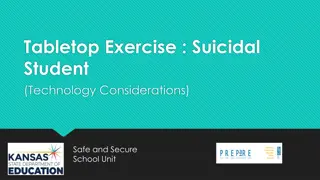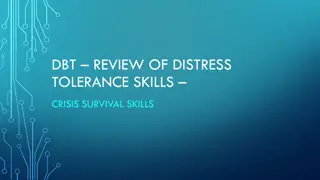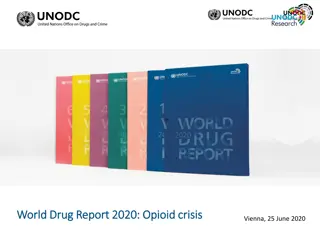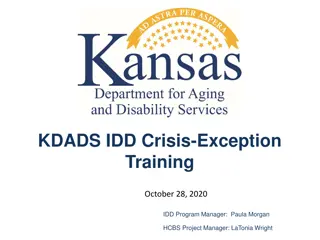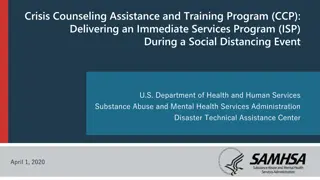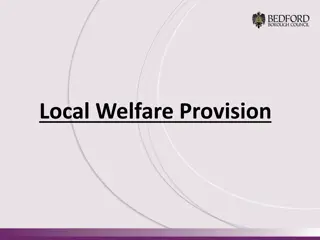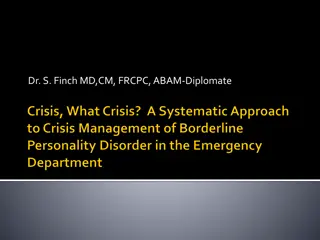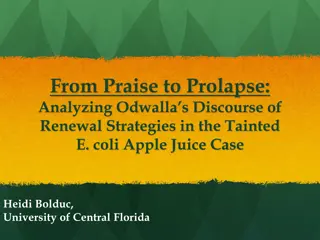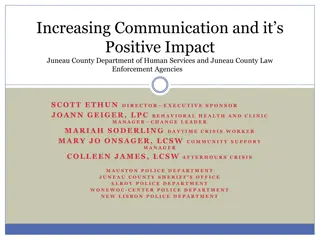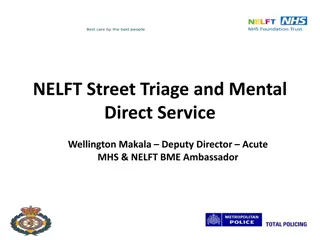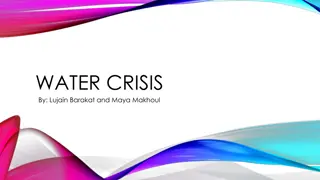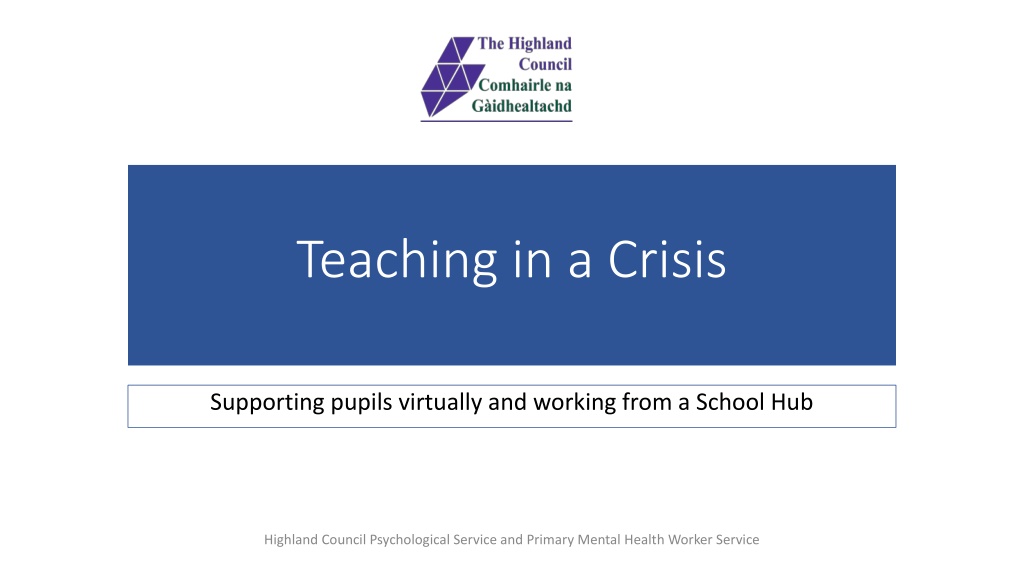
Supporting Pupils Virtually in Unusual Times
Explore key messages for staff working with children and young people virtually. Learn to manage feelings, understand children's emotions, and provide support during these challenging times. Access further information and guidance from the Highland Council Psychological Service and Primary Mental Health Worker Service.
Download Presentation

Please find below an Image/Link to download the presentation.
The content on the website is provided AS IS for your information and personal use only. It may not be sold, licensed, or shared on other websites without obtaining consent from the author. If you encounter any issues during the download, it is possible that the publisher has removed the file from their server.
You are allowed to download the files provided on this website for personal or commercial use, subject to the condition that they are used lawfully. All files are the property of their respective owners.
The content on the website is provided AS IS for your information and personal use only. It may not be sold, licensed, or shared on other websites without obtaining consent from the author.
E N D
Presentation Transcript
Teaching in a Crisis Supporting pupils virtually and working from a School Hub Highland Council Psychological Service and Primary Mental Health Worker Service
Unusual Times We are in unusual times right now, but must ensure that staff who continue to work with children and young people follow the agreed guidance and policies available within Highland Council. This short training module is a summary of some of the key messages provided to staff who work with children and young people. Further information on any of the information contained in this module can be accessed on the Education Scotland website https://dera.ioe.ac.uk/31839/1/inc83-making-the-links-nurture-ACES- and-trauma.pdf Highland Council Psychological Service and Primary Mental Health Worker Service
Managing your Feelings The adult is 50% of every interaction with a child/young person, so its important to be honest with yourself about how you feel. To develop psychological safety and be emotionally available to children and young people, you need to be able to contain their feelings of stress and anxiety. It is normal to feel worried at this time and to be unsure and unsettled by the changes around us all. Try and control what you can and create some structure and support for yourself. If you don t yet feel confident creating on-line resources or engaging through ICT, talk to colleagues. Beg, borrow and steal ideas. We are all learning and people are keen to share. If you are finding it difficult to cope, give yourself time to process everything and talk with someone. Consider your wellbeing. It s important. If you have feelings that are overwhelming you, or are finding it difficult to manage your own stresses, or have underlying mental health needs, talk with your GP and follow the government guidance here . Highland Council Psychological Service and Primary Mental Health Worker Service
How children might feel Some children will not be concerned and will be enjoying the opportunities to do things that may be different and more creative. Some children who found going into a school building challenging, may be more relaxed and now may feel able to access a curriculum and activities appropriate to their age. They may be more engaged. Some children will have experienced adversity and trauma earlier in their lives or may be living in families that provide little structure or a sense of safety. Your regular contact will be important to them, although they might struggle to get organised to be there . Their priority will be to feel safe. Some children may have been just managing with a number of other worries and now might be feeling highly anxious and unsafe. They may have huge concerns from what they are hearing in the news and may not have adults at home who can contain their worries. They need to feel safe. Some children may be so overwhelmed and feel so unsafe that they will completely withdraw from social contact. It is important to keep trying to connect with them. Raise concerns if you can t engage them. Highland Council Psychological Service and Primary Mental Health Worker Service
Nurturing Principles 1. Children s learning is understood developmentally 2. The environment offers a safe base 3. The importance of nurture for the development of wellbeing 4. Language is a vital means of communication 5. All Behaviour is communication 6. Transitions are important in all lives Support for all children should be based on the nurture principles. These are even more important at times of crisis where children may feel more distressed and are looking to the adults in their lives to contain their worries and to keep them safe. For further information on the Nurture Principals, please see the module on Supporting Nurture in School Hubs . Highland Council Psychological Service and Primary Mental Health Worker Service
The effect of stress and trauma Some pupils will already have experienced significant trauma in their lives and it may be helpful to have an understanding of the effects of adversity, toxic stress and trauma on the development of children and young people. A short module is available here: https://www.acesonlinelearning.com/ Trauma in a child may trigger trauma in the adult. Adults need to respond to the child s developmental age/stage at any particular moment. Trauma can undermine the development of learning skills and the capacity for creative play which can help children to cope, leading to gaps in development and learning. We need to create psychological safety for children before they can learn. Children may have developed coping mechanisms in an effort to feel safe and in control, which can be misunderstood. Impulsivity. Hyper-vigilance. Short attention. Higher reactivity to stressors Fight/flight/freeze Children who have experienced trauma may have difficulty forming relationships with adults and peers and need help to do this. Less effective help seeking . Highland Council Psychological Service and Primary Mental Health Worker Service
The benefits of resilience and how to build it The more resilient a child is, the more able they are to mitigate against the influence of past adversity, trauma and current stressors. Resilience can be built through: Good personal relationships and developing social/emotional skills Having a go or developing practical/creative/musical skills or interests Good role models and peer support Maintaining connections with school Knowing where to get help in the community if needed Developing self-help skills ie asking for help when required Participation in sport and activity for both physical, mental and social health Good family support and engagement Anything you do at this time to develop the above skills will collectively help build resilience in children and young people. Highland Council Psychological Service and Primary Mental Health Worker Service
How to engage with others who may be distressed Foster a feeling of safety. Remain calm and contain their feelings. Talk about the current situation. Use facts. It s OK not to feel OK just now for both yourself and the children, so keeping a focus on what you CAN control is important. Take a developmental approach start from where they are and build on that. Children will often behave as they would have done at a younger age. Start from there. Get to know them better, talk about things unrelated to school hobbies, interests etc. Build trust be predictable, consistent and reliable. Don t let them down even virtually. If you are physically in the same space, build in purposeful breaks. Having downtime when getting angry might allow the anger to build. Make these cognitive distractions/thought breaks. Use the analogy of changing the channel. Older pupils could do some trivia/quiz activity for a few minutes in an area of interest. Give supportive feedback to reduce negative thinking. Praise effort and skill rather than the end product. Give room for improvement sandwiched between 2 positive comments. Recognise areas of strength feedback competencies on a regular basis. This will help them develop a more accurate self narrative. Show you like them for who they are, not just what they do. This is even more important when teaching online/virtually. All behaviour is communication (yours and theirs). Ignoring students when they misbehave can trigger feelings of neglect and abandonment. Ignore the behaviour, not the pupil. At these times validate their feelings, name the feeling and show empathy. Highland Council Psychological Service and Primary Mental Health Worker Service
Some ideas from Andy Hargreaves The most important thing in the next two months is not keeping up, step-by-step, with a prescribed curriculum, but keeping children engaged with learning and the idea of learning. This could be a chance to engage in wider learning, make up stories, memorise epic poems, sing karaoke with YouTube, make things, play outside, write letters (on paper) to friends they can t have playdates or get-togethers with, etc. Starting another interest while they ve time will not only occupy them now, it will impress their friends later. Make Covid-19 an opportunity for learning and not just an interruption to it. Make it the subject of a project in Maths, history, politics, geography etc. Get materials to parents that don t have them and concentrate your resources and time on children who need it most Be empathetic and supportive towards parents and about what they have to cope with now. The most important thing in stressed families is making children feel loved, safe and reassured, not dong worksheets. Value play indoor or outdoor play is essential learning. You ll be anxious about those children for whom home is not usually a safe haven you will not be able to ensure all children are safe. You have a part to play in this, but it is not solely your responsibility. Look after your own wellbeing. Then you will be more emotionally available to support them. Keep up the collaborative professionalism. Develop your skills and keep learning. Highland Council Psychological Service and Primary Mental Health Worker Service
Self Reflection How confident are you supporting children when they are distressed? Are you comfortable just being with them, rather than doing things to them? Children and young children can t learn if they don t feel safe. What changes can you make to help them feel safe? How can you help switch the channel when someone is upset? Share and exchange ideas about what works with a pupil different things will work for different people. Highland Council Psychological Service and Primary Mental Health Worker Service



